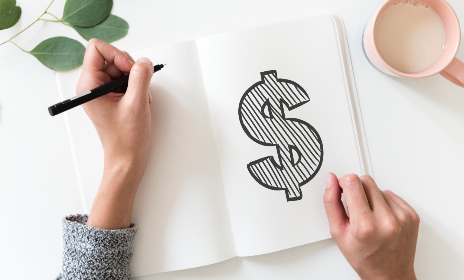Budgeting When Your Salary Fluctuates
 An increasing number of people are entering the freelance world instead of a typical 9 to 5 job. The perks can be intoxicating – the flexibility to set your own hours and work from anywhere in the world. But there are some downsides too, including a lack of benefits and a fluctuating salary that makes budgeting a challenge.
An increasing number of people are entering the freelance world instead of a typical 9 to 5 job. The perks can be intoxicating – the flexibility to set your own hours and work from anywhere in the world. But there are some downsides too, including a lack of benefits and a fluctuating salary that makes budgeting a challenge.
But just because you don’t know how much to plan for each month in your budget, it doesn’t mean you can’t rock your finances as a freelancer. Here are some tips to get you started.
Try to Budget Within the Lowest Amount You Could Bring In
If there are months where you earn $2,000 and months where you’ve doubled that, budgeting can be tricky. One way to work around that is by budgeting as close to your lowest earning month as possible. If you do better, it’s like you’re winning a mini lottery each month.
Then if you get extra money, you’re not counting on it for anything – you can use it for extra debt repayment, to bulk up your emergency savings, or to throw into an IRA.
Don’t Forget to Make a Line Item for Retirement
While drafting your budget, you have to include an amount for an IRA. You won’t be getting a 401k from an employer and you won’t be earning a pension. That means you won’t have a dime saved for retirement unless you make it a priority in your budget.
You can start off small if your budget is already tight. Or you can throw any extra money you get in big-earning months straight into an IRA account you already have set up.
That Emergency Fund is More Important Than Ever
Emergency funds are the cornerstone of any solid financial plan. But when you’re a freelancer with a fluctuating salary, they are even more important.
As a freelancer, you won’t get paid sick days or vacation days. That means if you are working, you aren’t earning any money. So a bad bacterial or viral illness could cost you days in lost wages. You have to have money set aside to help you cover that.
It’s really not a matter of if you’ll face that situation, it’s a matter of when. It’s best to be prepared for when it happens than to try to scramble and modify your budget when it does.
List Your Expenses From Most Important to Least Important
On your budget, start by listing your most important expense, which will likely be your house payment or rent. You need a place to live after all.
Keep ranking their importance down to the last bill. Things like gym memberships and cable television service will be at the bottom of this list.
Pay Things Off In That Order
Your first check of the month should go to the most important item. You’ll use that check, setting a small amount aside for essential gas or groceries to get you by for the time being. But any meals out shouldn’t be planned until closer to the end of the month when you have a better idea of whether you can afford them.
After that first check is gone, use your next check of the month to pick up where you left off on your list. By the time the month is done, ideally, you’ll have worked hard enough to have extra.
